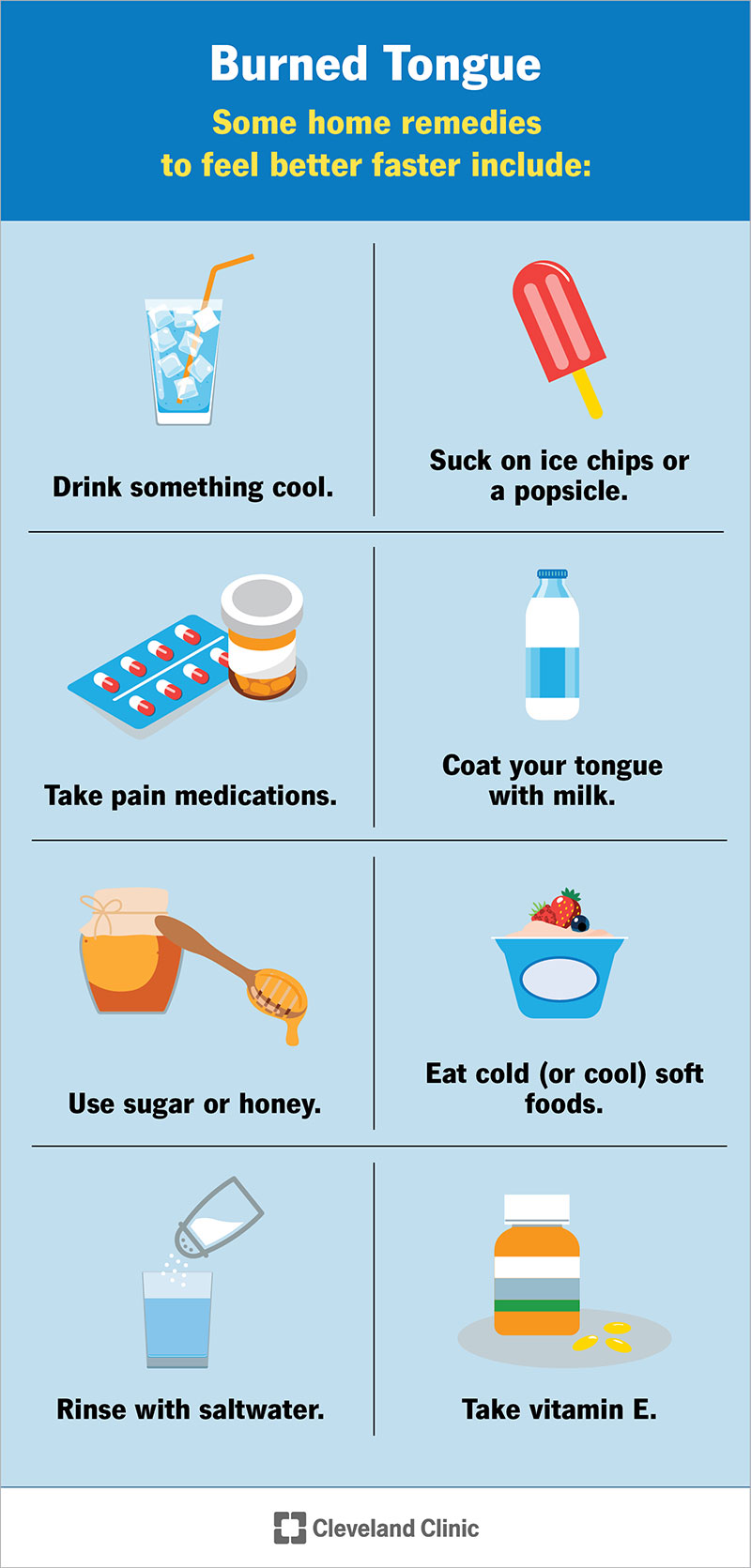Consuming hot foods and beverages can cause you to burn your tongue. Although tongue burns are unpleasant, they’re usually not serious. Drinking cold beverages and eating soft, cool foods can help. Pain medications, like over-the-counter NSAIDs, can relieve pain and inflammation. With most burns, your tongue and taste buds will heal within a week or two.
Advertisement
Cleveland Clinic is a non-profit academic medical center. Advertising on our site helps support our mission. We do not endorse non-Cleveland Clinic products or services. Policy
Eating foods or drinking liquids that are too hot can burn your tongue. Your tongue is a highly sensitive organ that helps you recognize tastes and textures. It consists of tiny bumps called papillae. Some of the papillae contain taste buds. Burning your tongue can damage the papillae and your taste buds. The damage can cause your tongue to hurt and make it harder to taste food and drinks.
Advertisement
Cleveland Clinic is a non-profit academic medical center. Advertising on our site helps support our mission. We do not endorse non-Cleveland Clinic products or services. Policy
Fortunately, most tongue burns aren’t serious, and taste buds heal quickly. And there are home remedies you can use to cope while your tongue heals. More serious burns, on the other hand, require immediate medical attention.
Most tongue burns aren’t serious and heal on their own. As with any burn, if the heat has damaged deep layers of tissue, you’ll need to see a healthcare provider immediately to prevent complications like infections.
You’ll be able to treat first-degree burns at home. A healthcare provider needs to treat second- and third-degree burns. If you’re unsure about the severity of a burn, see a healthcare provider.
Advertisement
Tongue burns can happen when you don’t allow food or drinks adequate cool time before consuming them. Being distracted is a major culprit. Many people eat meals or snacks in a rush and aren’t paying attention to things like heat. It’s easy to take a big bite of piping hot food or a gulp of a steaming hot drink because you’re multitasking. You’re going through the motions of eating or drinking, but your mind is elsewhere.
Microwaved foods are a major cause of tongue burns. Microwaves heat food unevenly, which can be deceptive. While the first bite may seem cool enough, the next one may burn your tongue.
Symptoms will depend on how serious your burn is. In addition to the burning, you may experience:
People with a condition called geographic tongue may also have a smooth tongue, redness and a burning feeling in their mouths, but this is different from a tongue burn. Geographic tongue is a harmless condition involving smooth red patches bordered by white or gray tissue on your tongue. Doctors aren’t sure what causes geographic tongue, but it’s unrelated to burns.

Image content: This image is available to view online.
View image online (https://my.clevelandclinic.org/-/scassets/Images/org/health/articles/24534-burned-tongue)
A healthcare provider can tell how serious a burn is by examining your tongue. They’ll ask what happened before it started burning to try and pinpoint a cause.
Most burns heal quickly on their own, within a week or two. In the meantime, you can use several home remedies to feel better faster.
Do:
Advertisement
Don’t:
See a healthcare provider if your tongue isn’t healing or still hurts after a week.
Your tongue heals fast. The cells in your taste buds regenerate every one to two weeks. Even if foods taste less flavorful for a short while following a tongue burn, your taste should return to normal within a week or so.
The best way to prevent a tongue burn is to taste test your food before taking a big bite. For example, take a small sip before drinking a hot beverage. In addition to protecting your tongue from burns, focusing on your food and drink can help you eat more mindfully. Mindful eating can help you make healthier food choices and allow you to savor your food more.
See a doctor or dentist immediately if you have symptoms of a second- or third-degree burn. Make an appointment if you’ve tried home remedies and your symptoms haven’t improved within a week.
See a healthcare provider immediately if you have symptoms of an infection, including:
Advertisement
A burned tongue shares symptoms with a condition called burning mouth syndrome — a burning sensation in your tongue or the roof of your mouth. But they’re not the same.
Unlike a tongue burn, burning mouth syndrome isn’t caused by damage to your tongue’s tissue. Instead, the burning is more of a sensation than a reaction to damaged tissue. It’s usually difficult to identify the cause. The burning sensation starts randomly, gradually worsens throughout the day and often improves at night. The cycle usually repeats the next day.
Burning mouth syndrome won’t naturally heal like a tongue burn. Instead, you’ll need to visit a healthcare provider to get diagnosed and treated.
The hectic pace of everyday life means that most people experience tongue burns at some point. It’s easy to take an enthusiastic bite of a pizza fresh out of the oven or a large gulp of recently brewed coffee without thinking about their temperature. Follow your instincts if you suddenly burn your tongue. Grab a cool drink of water or milk. Treat your tongue gently while it’s healing by avoiding salty, spicy or crunchy food. If you’re concerned that a burn is serious, see a healthcare provider. They can assess your injury and potentially prevent more serious complications, like an infection.
Advertisement
Learn more about the Health Library and our editorial process.
Cleveland Clinic's health articles are based on evidence-backed information and review by medical professionals to ensure accuracy, reliability, and up-to-date clinical standards.
Cleveland Clinic's health articles are based on evidence-backed information and review by medical professionals to ensure accuracy, reliability, and up-to-date clinical standards.
Cleveland Clinic’s primary care providers offer lifelong medical care. From sinus infections and high blood pressure to preventive screening, we’re here for you.
